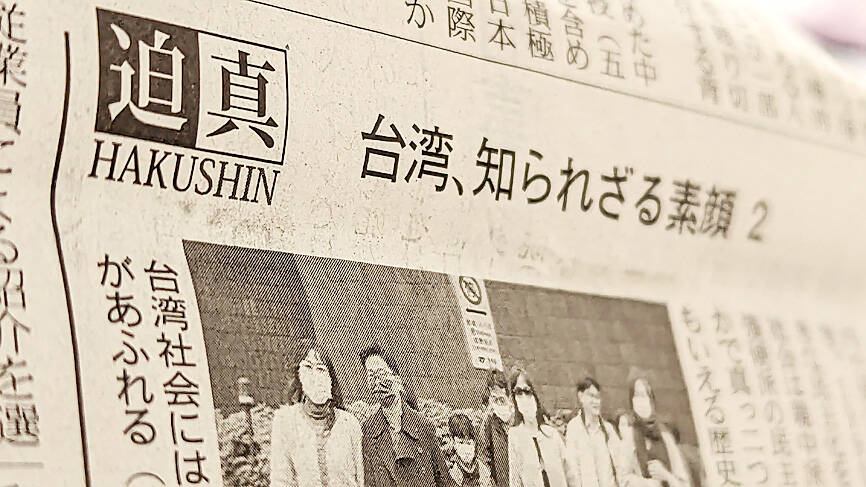The Ministry of Foreign Affairs yesterday called on Japan’s Nikkei newspaper to “seriously clarify” a report that “up to 90 percent” of Taiwan’s military retirees have collaborated with China for money.
The report on Tuesday said that up to 90 percent of military retirees have spent time in China, where they provided information to Beijing in exchange for money.
Citing an unnamed source, the report attributed the issue to the top ranks of the military being dominated by people with family lineages in China, saying that the government is not aware of the “true face” of the situation.

Photo: Lin Tsuei-yi, Taipei Times
The ministry said it doubts the veracity of the report.
“False news cannot be allowed to spread and mislead the public,” the ministry said, adding that it had asked the representative office in Japan to urge the newspaper to clarify the details of its report.
The article was “fabricated out of thin air,” and the newspaper used “sensational headlines to slander the integrity of national army officers and soldiers, and dividing troops,” the Ministry of National Defense said in a statement on Wednesday.
The article was detrimental to peace and stability in the Taiwan Strait, it added.
“The national military fights for the survival and development of the Republic of China. We fight for the security and welfare of the people of Taiwan, Penghu, Kinmen and Matsu,” it said. “We are unwavering in our resolve to safeguard the nation’s freedom and democracy with the full extent of our forces.”
The defense ministry said it has long been aware of China’s ambitions to use military retirees to obtain information.
It has implemented measures to counter such activities, including investigating individuals considered “high risk,” it added.
The defense ministry has implemented an information campaign at the administrative level of the military to improve awareness of Chinese threats, adding that it is working with intelligence officials to reduce China’s intelligence-gathering abilities.
“We have worked hard to foster a spirit of loyalty among [military] personnel,” it said.
Veterans Affairs Council Minister Feng Shih-kuan (馮世寬), who served as minister of national defense from 2016 to 2018, yesterday called the report “complete nonsense.”

Taiwan is projected to lose a working-age population of about 6.67 million people in two waves of retirement in the coming years, as the nation confronts accelerating demographic decline and a shortage of younger workers to take their place, the Ministry of the Interior said. Taiwan experienced its largest baby boom between 1958 and 1966, when the population grew by 3.78 million, followed by a second surge of 2.89 million between 1976 and 1982, ministry data showed. In 2023, the first of those baby boom generations — those born in the late 1950s and early 1960s — began to enter retirement, triggering

ECONOMIC BOOST: Should the more than 23 million people eligible for the NT$10,000 handouts spend them the same way as in 2023, GDP could rise 0.5 percent, an official said Universal cash handouts of NT$10,000 (US$330) are to be disbursed late next month at the earliest — including to permanent residents and foreign residents married to Taiwanese — pending legislative approval, the Ministry of Finance said yesterday. The Executive Yuan yesterday approved the Special Act for Strengthening Economic, Social and National Security Resilience in Response to International Circumstances (因應國際情勢強化經濟社會及民生國安韌性特別條例). The NT$550 billion special budget includes NT$236 billion for the cash handouts, plus an additional NT$20 billion set aside as reserve funds, expected to be used to support industries. Handouts might begin one month after the bill is promulgated and would be completed within

NO CHANGE: The TRA makes clear that the US does not consider the status of Taiwan to have been determined by WWII-era documents, a former AIT deputy director said The American Institute in Taiwan’s (AIT) comments that World War-II era documents do not determine Taiwan’s political status accurately conveyed the US’ stance, the US Department of State said. An AIT spokesperson on Saturday said that a Chinese official mischaracterized World War II-era documents as stating that Taiwan was ceded to the China. The remarks from the US’ de facto embassy in Taiwan drew criticism from the Ma Ying-jeou Foundation, whose director said the comments put Taiwan in danger. The Chinese-language United Daily News yesterday reported that a US State Department spokesperson confirmed the AIT’s position. They added that the US would continue to

IMPORTANT BACKER: China seeks to expel US influence from the Indo-Pacific region and supplant Washington as the global leader, MAC Minister Chiu Chui-cheng said China is preparing for war to seize Taiwan, Mainland Affairs Council (MAC) Minister Chiu Chui-cheng (邱垂正) said in Washington on Friday, warning that Taiwan’s fall would trigger a regional “domino effect” endangering US security. In a speech titled “Maintaining the Peaceful and Stable Status Quo Across the Taiwan Strait is in Line with the Shared Interests of Taiwan and the United States,” Chiu said Taiwan’s strategic importance is “closely tied” to US interests. Geopolitically, Taiwan sits in a “core position” in the first island chain — an arc stretching from Japan, through Taiwan and the Philippines, to Borneo, which is shared by